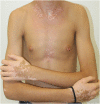Patients with vitiligo have a distinct affective temperament profile: A cross-sectional study using Temperament Evaluation of Memphis, Paris, and San Diego Auto-Questionnaire
- PMID: 36751331
- PMCID: PMC9892478
- DOI: 10.1002/ski2.157
Patients with vitiligo have a distinct affective temperament profile: A cross-sectional study using Temperament Evaluation of Memphis, Paris, and San Diego Auto-Questionnaire
Abstract
Background: Vitiligo is a skin disease associated with significant psychiatric comorbidities. Affective temperaments represent the inherited foundation of personality and represent the biologically stable part of emotional reactivity. Studies assessing the temperament profile of patients with vitiligo are still scarce.
Method: This was a cross-sectional study enrolling 34 patients with vitiligo and 34 age and sex-matched healthy controls. Affective temperament profile was investigated using the Temperament Evaluation of Memphis, Paris, and San Diego Auto-questionnaire. Dermatology life quality index was used to evaluate disease impact on patients' quality of life.
Results: We found significant differences with vitiligo patients scoring higher in anxious (11.5 ± 4.76 vs. 9.06 ± 6.22; p = 0.036) and lower in hyperthymic (5.79 ± 3.82 vs. 7.5 ± 3.64; p = 0.027) temperaments. Vitiligo worsening reported by patients was associated with recent psychological stressors in 18 cases (52.9%) and Koebner phenomenon in 20 cases (58.8%). Koebner phenomenon was more frequently associated with the hyperthymic temperament (p = 0.035). Cyclothymic temperament was positively correlated with Dermatology life quality index (rho = 0.417, p = 0.014).
Conclusions: This study demonstrated that patients with vitiligo have a distinct premorbid temperament profile. Having low hyperthymic and high anxious temperament traits seem to predispose patients to be less resilient to psychological stressors. A better understanding of the affective traits of vitiligo patients would be vital in personalising and adapting the management of this chronic skin disease.
© 2022 The Authors. Skin Health and Disease published by John Wiley & Sons Ltd on behalf of British Association of Dermatologists.
Conflict of interest statement
The author declares that there is no conflict of interest that could be perceived as prejudicing the impartiality of the research reported.
Figures
References
-
- Goodwin FK, Jamison KR. Manic‐depressive illness. New York: Oxford University Press; 1990, xxi. p. 938. (Manic‐depressive illness).
-
- Cottraux J, Blackburn I. Psychothérapies cognitives des troubles de la personnalité. NPG Neurologie ‐ Psychiatrie ‐ Gériatrie. 2007;7(37):41. 10.1016/s1627-4830(07)89961-2 - DOI
LinkOut - more resources
Full Text Sources


